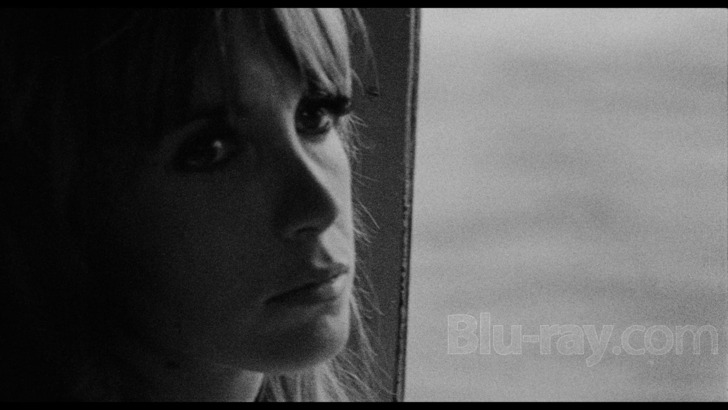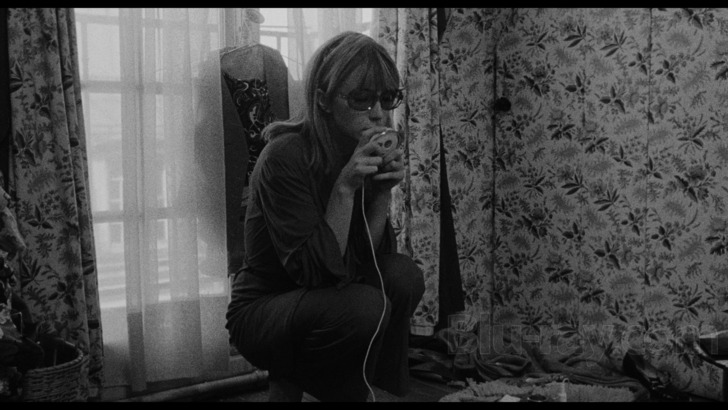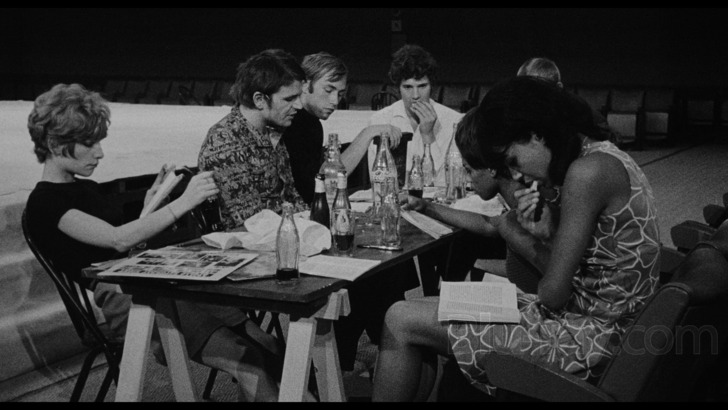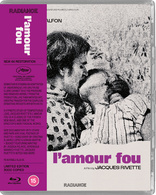L' amour fou Blu-ray Movie
HomeL' amour fou Blu-ray Movie 
Mad Love | Limited EditionRadiance Films | 1969 | 255 min | Rated BBFC: 15 | May 06, 2024
Movie rating
6.7 | / 10 |
Blu-ray rating
| Users | 0.0 | |
| Reviewer | 4.0 | |
| Overall | 4.0 |
Overview
L' amour fou (1969)
During the rehearsals for the production of the tragedy Andromaque, the leading actress and her director, a couple behind the scenes, can't find a way to leave their personal problems at home. And life imitates fiction, creating a real tragedy for this couple when the man finds comfort with other women while the actress prefers to stay focused on her work, as if nothing is happening with her partner.
Starring: Bulle Ogier, Jean-Pierre Kalfon, Michele Moretti, Françoise Godde, Maddly BamyDirector: Jacques Rivette
| Foreign | Uncertain |
| Drama | Uncertain |
| Romance | Uncertain |
Specifications
Video
Video codec: MPEG-4 AVC
Video resolution: 1080p
Aspect ratio: 1.85:1
Original aspect ratio: 1.85:1
Audio
French: DTS-HD Master Audio 2.0 Mono
Subtitles
English
Discs
Blu-ray Disc
Two-disc set (2 BDs)
Playback
Region B (A, C untested)
Review
Rating summary
| Movie | 4.0 | |
| Video | 4.0 | |
| Audio | 4.0 | |
| Extras | 4.0 | |
| Overall | 4.0 |
L' amour fou Blu-ray Movie Review
Reviewed by Jeffrey Kauffman April 25, 2024Cohen Media Group has been on something of a Jacques Rivette tear for the Region A audience for several years now, with releases of any number of Rivette films, including (in no particular order) The Gang of Four, La Belle Noiseuse, Love on the Ground, Up, Down, Fragile and Secret Defense. A number of Rivette films, including the Cohen releases linked to above as well as several others, have also come courtesy of other distributors in various regions, which makes the absence in any region of one of Rivette's most celebrated films maybe just a little perplexing. That deficit has now been erased "times two" courtesy of this release for the UK and Region B, but with a French release as well which has just recently streeted as this review is being written. Rivette's films often delight in "meta" aspects, frequently utilizing the conceit of actors rehearsing, and that's once again the case again here, though Rivette maybe offers whatever the French champagne equivalent of "hold my beer" is, by having L'amour fou feature a film crew documenting the rehearsals, a crew which is often seen by the more "remote" narrative camera. Rivette further toys with audience expectations by having the film crew in the film shoot in 16mm, while the "external" crew utilized 35mm. Rather fascinatingly in this regard, one of the supplements calls the 35mm material more "documentarian" than the 16mm material, something that may seem to be the exact opposite of many traditional perceptions about documentaries, which have often used the smaller format, and which seems to overtly contradict the depiction of what sure seems like a documentary crew filming rehearsals of Andromaque.

For readers who understandably scoff at critics and their "pronouncements", it may instructive to remember that the French New Wave was sparked by and large by a coterie of film journalists at Cahiers du Cinema, and in fact some of the supplements on Disc Two of this two disc release get into some of the history of that magazine and the many icons who wrote for it through the years. In that regard, some may almost automatically cite people and films like Jean-Luc Godard and Breathless or François Truffaut and The 400 Blows as paradigms of what the French call Nouvelle Vague, but Cahiers du Cinema also introduced any number of other titans in the French film industry to the public, including not just Rivette, but Éric Rohmer, Claude Chabrol, Agnès Varda, Jacques Demy and Alain Resnais, each of whom brought their own rather distinctive sensibilities to the "movement".
With tongue perhaps just slightly planted in cheek, some may feel like Rivette's "sensibilities" could be on the drawn out, meandering side of things, and in that regard it's probably salient to note that L'amour fou runs over four hours. That extreme length may become just a bit hilarious when it's noted that Rivette followed up this opus with Out 1 , which rather infamously runs for close to thirteen hours. These two films may be more than enough evidence to suggest that Rivette never minded adopting a "relaxed" attitude toward narrative momentum, but in the case of L'amour fou, there actually is considerable forward movement courtesy of both some interpersonal relationships between the members of the theatrical troupe, but also definitely presentationally since Rivette frequently shows the 16mm crew and utilizes "their" footage throughout the film.
And that may be where "film theory" meets "film reality", for as much as some of the supplements may try to draw distinctions as to "why" Rivette uses the two formats at various junctures, even the supplements themselves tend to almost immediately offer exceptions to whatever rule they're positing (i.e., the 16mm footage was the sole use of close-ups, which is then countered with some 35mm close-ups). This brings to mind a rather infamous analysis by one of those aforementioned boneheaded critics who saw Lindsay Anderson's If.... and came out with some high-falutin' take on why Anderson ping ponged between color and black and white segments, supposedly finding all sorts of arcane "reasons" for the choices. Absolutely hilariously, Anderson went on record stating he simply ran out of money for color stock and opted to use black and white instead. So even if the "reasons" for Rivette's own ping ponging between 35mm and 16mm may arguably be a bit more opaque than some of the supplements suggest, the technique adds a kind of oddly voyeuristic quality to things.
That quality extends probably most overtly to some of the almost Douglas Sirkian (or perhaps considering some similar plot elements in All That Jazz, Bob Fosse-ish) melodramatic aspects displayed in the deteriorating relationship between director Sebastien (Jean-Pierre Kalfon) and lead actress Claire (Bulle Ogier). That said, this particular "peeping tom" aspect is probably a bit more circumspect than the scenes featuring the acting troupe where the 16mm film crew is covering rehearsals.
L' amour fou Blu-ray Movie, Video Quality 

L'amour fou is presented on Blu-ray courtesy of Radiance Films with an AVC encoded 1080p transfer in 1.85:1. Radiance sent check discs for purposes of this review, and so I'm not privy to any verbiage that may be in their insert booklet, but Radiance's website offers "4K restoration from materials kept at Les Archives du Film and in Éclair-Preservation, under the supervision of Caroline Champetier", and some text cards prefacing the actual film give even more information, as follows:
The 35mm negative of L'Amour fou was burned in a laboratory fire in 1973. It was restored with materials from various sources preserved in the Archives du Film and Éclair-Preservation stocks. The restoration of this film was supported by the CNC. L'amour fou was shot in Paris, in July - August 1967. The 4K restoration was made by the Hiventy Laboratory under the supervision of Caroline Champetier, AFC.Even more information about the transfer is disclosed in a rather fascinating supplement on Disc Two detailing the "restoration" efforts, which Champetier actually says is probably more accurately called a reconstruction. Also interestingly, it turns out it was mostly the 35mm negative material that was lost, and at least some of the original 16mm elements evidently survived since they were stored in a different location. All of this is to say, as is readily talked about in the restoration supplement, a transfer culled from at least some elements somewhat down the "dupe" hierarchy, which the restoration team had to somehow deal with an integrate into a presentation that despite the obvious differences between the 16mm and 35mm stocks, still offered something approaching consistency. It may surprise some to hear that in terms of "grain management" Champetier actually argues they added more than they subtracted, for what that's worth, and there's no denying that the 16mm material in particular has a rather gritty appearance, with understandably less the fulsome fine detail levels in midrange and wider framings. There is still some age related wear and tear on display despite the restoration efforts, mostly in the form of smaller nicks and scratches. Interestingly, those seem to turn up a bit more regularly (or are perhaps more noticeable) on the 16mm footage, which from the sounds of things in the restoration featurette may have included more original negative material than the 35mm footage.
L' amour fou Blu-ray Movie, Audio Quality 

L'amour Fou features a DTS-HD Master Audio 2.0 Mono track that can frankly sound just a trifle brash in the higher registers when Jean- Claude Éloy's astringent score plays (Eloy's work kind of reminded me of some of the cacophonous chamber music of Edgard Varèse, if that helps to specify what may on tap for listeners). Otherwise, though, the track provides perfectly capable support for dialogue and, in some scenes like a cafe, background ambient environmental sounds. Optional English subtitles are available.
L' amour fou Blu-ray Movie, Special Features and Extras 

Radiance has packaged this release with the feature on Disc One and the following supplements on Disc Two:
- Cinema Redefined: Jacques Rivette's L'amour fou Revisted (HD; 1:33:53) is a really interesting newly produced documentary stuffed full of talking heads like Jean-Pierre Kalfon, Pascal Bonitzer, Antoine de Baecque and Sylvie Pierre, along with archival footage of Rivette. I found the early going in this just a little jolting because there are "now and then" views of locations, and the "then" shots are culled from the film with Jean-Claude Éloy's pretty abrasive score suddenly erupting out of nowhere. Subtitled in English.
- The Third Eye (HD; 14:07) is a new visual essay by Cristina Álvarez López and Adrian Martin which seeks to "explain" the uses of 16mm and 35mm.
- Restoring L'amour fou (HD; 27:14) is a newly filmed interview with the aforementioned Caroline Champetier along with Audrey Birrien, moderated by Antoine Guillot. There seems to be a bit of subtext between Champetier and Birrien is all I'll say, but the information imparted here is first rate and should be enjoyed by film preservationists. Subtitled in English.
- Trailer (HD; 1:29)
L' amour fou Blu-ray Movie, Overall Score and Recommendation 

Shortly after one of my reviews of a Cohen Rivette disc went live (I think it may have been La Belle Noiseuse, but I frankly can't remember at this point), I received a perfectly delightful PM from a reader here who was a native born Frenchman and who kind of hilariously wrote, "I hope you realize how pretentious many of us French find Rivette to be". My hunch is that particular reader will find plenty of evidence for that perception in L'amour fou, and the daunting length of this piece means it obviously will take a bit of commitment (and perhaps patience), but in terms of the then nascent French New Wave, this is another sterling example of a young filmmaker coming along and smashing conventions left and right (including running time, it might be stated). Technical merits are generally solid and the supplements outstanding. Recommended.
Similar titles
Similar titles you might also like

Suzhou River
苏州河 / Sūzhōu hé | Standard Edition
2000

Le Combat dans l'île
Fire and Ice | Standard Edition
1962

Fox and His Friends
Faustrecht der Freiheit
1975

Floating Clouds
浮雲 / Ukigumo
1955

Nights of Cabiria
Le notti di Cabiria / Vintage World Cinema
1957

The Lovers
Les amants
1958

Full Moon in Paris
Les nuits de la pleine lune
1984

Masculin Féminin
1966

The Green Ray
Summer / Le rayon vert
1986

The Bitter Tears of Petra von Kant
Die bitteren Tränen der Petra von Kant / Arrow Academy
1972

The Story of the Last Chrysanthemums
Zangiku monogatari
1939

Boy Meets Girl
1984

Tale of Cinema
극장전 / Geuk jang jeon
2005

Crisis
Kris
1946

Lola
Vintage World Cinema
1981

César et Rosalie
Cesar & Rosalie
1972

Torment
Hets
1944

Summer with Monika
Sommaren med Monika
1953

Charulata
চারুলতা / The Lonely Wife
1964

La captive
The Captive
2000

